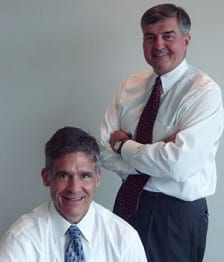Bond experts advise balanced investing

Dan McPhail knows that there’s a potential financial storm brewing on the economic horizon. But he believes it’s still a long way off. Besides, his firm has a reliable fixed-income investment strategy to keep its clients dry.
That threat, better known as a bond bubble, is “a concern down the road, but not imminent,” said McPhail, managing director of D.M. Kelly & Co., a Des Moines brokerage firm specializing in fixed-income investments.
“With the stimulus money and the federal government trying to ease credit and create money to jump-start our economy, there is a fear out there by many investment advisers of inflation showing up,” said McPhail, who has nearly 30 years of experience in bond trading. Though today’s environment is still largely deflationary, those moves could in the long run weaken the dollar, which would cause some level of inflation and eventually higher interest rates, he said.
Total return
Founded in 1995 by Dan Kelly, the brokerage firm has quietly grown to become one of the largest in Central Iowa specializing in fixed-income investments. The 15-person firm currently manages approximately $1.2 billion in assets for more than 2,500 individual and institutional clients, and also owns an investment advisory company in Billings, Mont.
Though it offers a range of high-quality equity investments and builds complete portfolios, D.M. Kelly’s primary focus is fixed-income securities, ranging from tax-advantaged municipal bonds to corporate and government bonds.
“We think investing a certain portion of one’s portfolio in bonds is very important, from the standpoint of providing steady income to our clients,” McPhail said. “Also, as we’ve found out in recent years, it’s an important component of the total return to investors.”
For instance, the Standard & Poor’s 500 equity index has had a cumulative negative return for the past 10 years. “If a person had been allocated to some percentage of bonds or fixed-income (securities), they could have easily had a reasonable positive average annual return over those 10 years,” he said.
During recessions, investors generally tend to flock to fixed-income investments, said Doug Peckumn, a vice president with D.M. Kelly. “It’s kind of that flight to safety attitude,” Peckumn said. “I think we do enjoy an uptick in people knocking on our door when that happens, without a doubt.”
Investing directly in bonds, rather than in bond mutual funds, also provides a more predictable investment, McPhail said.
“We use a few bond funds, but not many,” he said. “We feel that by owning individual securities, you know what the maturity date is, what the call date is, what the specific yields are, and there’s nothing left to uncertainty.”
Direct investing also enables investors to avoid the dilutionary effect that bond fund investors experience when yields are declining. “They’re being diluted with the new money that’s going to be invested at lower yields, which is not going to enhance their income position,” he said. “As a result, you don’t know how and when you get all your principal back; you don’t know what your interest income is going to be in the future.”
Key hires
Dan Kelly, who managed the Des Moines office of what was then Dain Bosworth for about 20 years before launching his own firm, hired both Peckumn and McPhail to that office in the early 1980s.
McPhail, who received a finance degree from the University of Nebraska at Lincoln, grew up in Omaha, just three blocks from where Warren Buffett still resides. He moved from Omaha to Des Moines in 1974 while working for IBM Corp. After seven years with Big Blue, he started his financial career at Dain Bosworth, and joined D.M. Kelly in 1999. Peckumn, a West Des Moines native and University of Iowa graduate, joined the firm in 2000.
A year ago, McPhail hired Bob Dorweiler, a municipal bond trader with about 30 years of experience in the industry.
“We’re very excited because we feel we have the most experienced tax-free bond trading operation in the state of Iowa,” McPhail said. “We had worked with Bob for many years at RBC Dain; he ran their municipal bond operation. He handles municipal bond issues in several Midwest states, but primarily Iowa.”
The ability to trade bonds internally provides benefits to clients.
“When you’re in an economic environment where you’re dealing with single-digit average annual returns, all of a sudden the expense side of the equation becomes very important,” McPhail said. “By us having our own bond operation internally, we’re able to access many bond issues for our clients. And we get compensated by the issuer on the underwriting spread; we do not have to charge an additional fee or transaction cost to our individual clients, and in today’s environment, that’s very significant.”
The firm has always taken a balanced investing approach, McPhail said, with two primary strategies.
“Number one, we always stick with ‘laddering’ of maturities for fixed-income investments, whether it’s tax-free municipal bonds, government securities, corporate bonds, so we’re spreading the risk out over a period of years,” McPhail said. “We’re not necessarily trying to make a large wager on whether interest rates are going to go up quickly or go down in the near term. In this environment, some people might define it as sticking to more intermediate maturities.”
On the equity side, the firm is constantly searching for quality companies with good dividend yields, he said.
“With corporate bond yields as low as they are, you can buy the corresponding company’s common stock, and get a dividend yield that might be equal to their short-term bond yields, if not higher,” McPhail said, with yields that could range from 3 to 5 percent for many companies. “And in many cases, it’s an increasing dividend stream,” he said. “We think the risk-reward (equation) of owning investments like that is good.”
Considering bonds, why buy government issues these days, when the rates are so low?
“We tend to look at that on a client-by-client basis,” Peckumn said.
“We have a lot of clients who either need to be or are risk-averse. They may not like the interest rates, but venturing outside of government issues or CDs with FDIC backing just isn’t appropriate for some people. Some people really shouldn’t be outside of that government safety net because they can’t live with the volatility.” On the other hand, “Dan and I have lots of 85-year-old clients that like to buy 20-year bonds because they want the higher coupon rates of return,” Peckumn said. “They have their estate plan set up so they’re not concerned necessarily about changes in principal value as much as current income. We certainly try to tailor our portfolios to the needs of our clients.”
McPhail added, “The bottom line is, as long as the quality of the issuer is good, their heirs will deal with those tax-free municipal bonds, which happen to be quite liquid and have a very good secondary market. So in reality, the old adage of ‘Will I mature before my bonds do?’ is not really a concern for our clients.”










